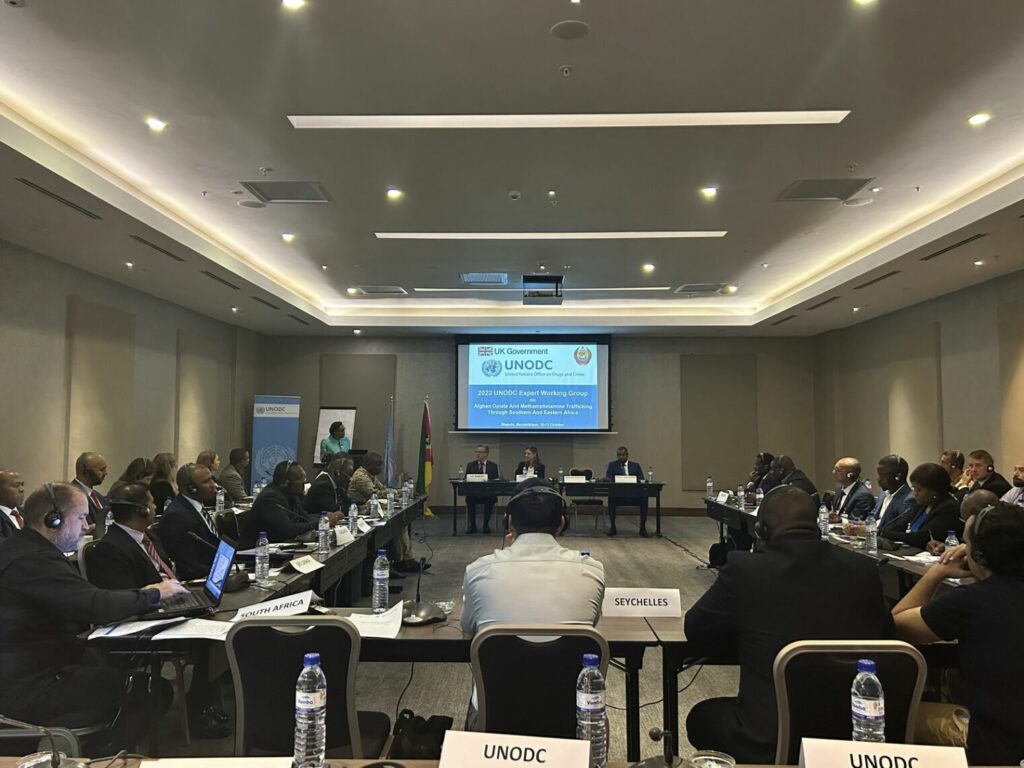“This Expert Working Group takes advantage of the convening power of the UNODC, to bring together Member States and Regional Organisations to discuss ways to better address the challenge of the trafficking of illegal drugs from Afghanistan to Africa,” underscored Michael Osman, Head of Criminal Investigation and Analysis Project, part of the UNODC Global Programme on Criminal Network Disruption. The meeting gathered representatives from Mozambique, Malawi, Mauritius, Pakistan, Seychelles, Sri Lanka, South Africa, Tanzania and Zambia, as well as from key relevant organizations, such as the Combined Maritime Forces and European Monitoring Centre for Drugs and Drug Addiction, and governmental experts from the UK Home Office and the United States Drug Enforcement Administration. Among others, Participants discussed the latest trends, transnational threats and impact of opiates and methamphetamine trafficking in the region along the Southern Route.
In her opening remarks, Filomena Chitsondzo, Director of the Central Office for the Prevention and Combat of Drugs of Mozambique, the event’s host country, envisioned the meeting as a platform for “designing initiatives that can contribute to a strong partnership [between Member States] in counter drug trafficking efforts, including of chemical precursors, along the Southern Route.”
“As the role of trafficking along the Southern Route grows in prominence, African member states, especially those on the eastern coast, will increasingly bear the significant burdens inflicted by these criminal networks, who have no respect for their sovereignty, security or vulnerable communities,” remarked British High Commissioner to the Republic of Mozambique Helen Lewis at the opening ceremony of the event. The event, organized by the UNODC Programme Office in Mozambique and the UNODC Criminal Investigation and Analysis Project, was made possible thanks to the generous financial support from the United Kingdom. “The UK Government remains steadfast in confronting these criminal networks and welcomes the tireless efforts by the UNODC and member states to work collaboratively on this issue,” stated the British High Commissioner.
Connecting the dots
Key outcomes from the meeting included concrete discussions on enhancing real time intelligence sharing capabilities between the Member States in the regions affected along the route, with a constructive proposal on how to leverage existing mechanisms and alliances such as the Trilateral Planning Cell (TPC).
The TPC is a tripartite cooperation mechanism established by the ministries responsible for policing of the Republics of South Africa, Mozambique and Tanzania, with the support of the UNODC, to counter drug trafficking through the Southern Route. The representatives and members of the TPC presented success stories on exchange of actionable intelligence between the members and beyond, that led to successful seizure of drugs and arrests. The participants were encouraged by this and actively discussed action points on how to build further on these recent accomplishments to improve the regional understanding of criminal networks and come up with strategies to deter them.
The meeting also discussed demand and harm reduction strategies and shared relevant updates on their ongoing programmes, best practices, and plans for the future. Address Munene, Director of the Education and Counselling Department of the Drug Enforcement Commission of Zambia, welcomed the meeting, stating its importance in terms of receiving updated information on the type of drugs and precursor chemical mixtures currently available on the market.
“This will help us to step up our game to make sure that our citizens that we are serving are indeed helped,” referring to people struggling with drug use.
Finally, the participants discussed requests from Member States on support to enhancing intelligence analysis capabilities at the regional level, as well as supporting technical forensics and legal finishing and prosecution. The findings from this operational discussion session will be incorporated into an assessment on opiates and methamphetamine trafficking along the southern route, to be published in 2024.
Source link : https://www.unodc.org/rosaf/stories/2023/October/new-trends-and-early-warning-signs-affecting-eastern-and-southern-africa.html
Author :
Publish date : 2023-10-11 07:00:00
Copyright for syndicated content belongs to the linked Source.
